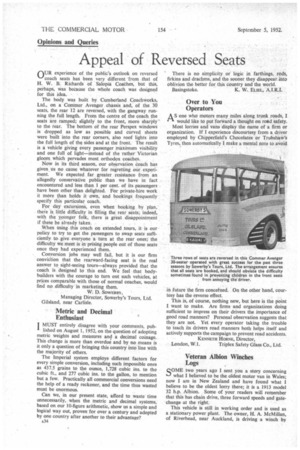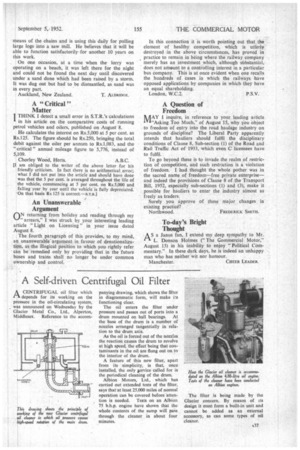Appeal of Reversed Seats
Page 48

Page 51

If you've noticed an error in this article please click here to report it so we can fix it.
0UR experience of the public's outlook on reversed coach seats has been very different from that of H. W. B. Richards of Salopia Coaches, but this, perhaps, was because the whole coach was designed for this idea. •
The body was built by Cumberland Coachworks, Ltd., on a Commer Avenger chassis and, of the 30 seats, the rear 12 are reversed, with the gangway running the full length. From the centre of the coach the seats are ramped; slightly to the front, more sharply to the rear. The bottom of the rear Perspex windows is dropped as low as possible and curved sheets were built into the rear corners, also roof lights into the full length of the sides and at the front. The result is a vehicle giving every passenger maximum visibility and one full of light—instead of the rather Victorian gloom which pervades most orthodox coaches.
Now in its third season, our observation coach has given us no cause whatever for regretting our experiment. We expected far greater resistance from an allegedly conservative public than we have in fact encountered and less than 1 per cent, of its passengers have been other than delighted. For private-hire work it more than holds it own, and bookings frequently specify this particular coach.
For day excursions, even when booking by plan, there is little difficulty in filling the rear seats; indeed, with the younger. folk, there is great disappointment if these be already taken.
When using this coach on extended tours, it is our policy, to try to get the passengers to swap seats sufficiently to give everyone a turn at the rear ones; the difficulty we meet is in prising people out of those seats once they had experienced them.
Conversion jobs may well fail, but it is our firm conviction that the rearward-facing seat is the real answer to sight-seeing tours---always provided that the coach is designed to this end. We feel that bodybuilders with the courage to turn out such vehicles, at prices comparable with those of normal coaches, would find no difficulty in marketing them.
W. D. SOWERBY, Managing Director, Sowerby's Tours, Ltd. Gilsland, near Carlisle.
Metric and Decimal Enthusiast
I MUST entirely disagree with your comments, pub
lished on August 1, 1952, on the question of adopting metric weights and measures and a decimal coinage. This change is more than overdue and by no means is it only a question of bringing this country into line with the majority of others.
The Imperial system employs different factors for every simple conversion, including such impossible ones as 437.5 grains to the ounce, 1,728 cubic ins, to the cubic ft., and 277 cubic ins, to the gallon, to mention but a few. Practically all commercial conversions need the help of a ready reckoner, and the time thus wasted must be enormous.
Can we, in our present state, afford to waste time unnecessarily, when the metric and decimal systems, based on our 10-figure arithmetic, show us a simple and logical way out, proven for over a century and adopted by one country after another to their advantage?
A34 There is no simplicity or logic in farthings, rods, firkins and drachms, and the sooner they disappear into oblivion the better for this country and the world.
Basingstoke. K. W. ELIEL, A.I.R.I.
Over to You Operators
AS one who motors many miles along trunk roads, I would like to put forward a thought on road safety. Most lorries and vans display the name of a firm or organization. If I experience discourtesy from a driver employed by Chipperfield's Chocolates or Trubshaw's Tyres, then automatically I make a mental note to avoid
Three rows of seats are reversed in this Commer Avenger 30-seater operated with great success for the past three seasons by Sowerby's Tours, Ltd. The arrangement ensures that all seats are booked, and should obviate the difficulty sometimes found in preyenting children in the front seats from annoying the driver.
in future the firm concefned. On the other hand, courtesy has the reverse effect.
This is, of course, nothing new, but here is the point I want to make. Are firms and organizations doing sufficient to impress on their drivers the importance of good road manners? Personal observation suggests that they are not. Yet every operator taking the trouble to teach its drivers road manners both helps itself and actively supports the campaign to prevent road accidents.
KENNETH HORNS, Director,
London, W.1. Triplex Safety Glass Co., Ltd.
Veteran Albion Winches Logs
SOME two years ago I sent you a story concerning what I believed to be the oldest motor van in Wales; now I am in New Zealand and have found what I believe to be the oldest lorry there; it is a 1913 model 32 h.p. Albion. Some of your readers will remember that this has chain drive, three forward speeds and gatechange at the right.
This vehicle is still in working order and is used as a stationary power plant. The owner, H. A. McMillan, of Riverhead, near Auckland, is driving a winch by means of the chains and is using this daily for pulling large logs into a saw mill. He believes that it will be able to function satisfactorily, for another 10 years on this work.
On one occasion, at a time when the lorry was operating on a beach, it was left there for the night and could not be found the next day until discovered under a sand dune which had been raised by a storm. It was dug out but had to be dismantled, as sand was in every part.
Auckland, New Zealand. T. ALDRIDGE.
A "Critical " Matter
I THINK I detect a small error in S.T_R.'s calculations in his article on the comparative costs of running petrol vehicles and oilers, published on August 8. He calculates the interest on Rs.5,000 at 5 per cent. as Rs.125. The figure should be Rs.250, bringing the total debit against the oiler per annum to Rs.1,083, and the " critical " annual mileage figure to 5,776, instead of 5,109.
Chorley Wood, Herts. A.B.C.
[I am obliged to the writer of the above letter for his friendly criticism. In fact there is no arithmetical error; what I did not put into the article and should have done was that the 5 per cent. is averaged throughout the life of the vehicle, commencing at 5 per cent. on Rs.5,000 and falling year by year until the vehicle is fully depreciated. On that basis Rs 125 is correct.—S.T.R.] An Unanswerable Argument r-IN returning from holiday and reading through my "-'" arrears," I was struck by your interesting leading article "Light on Licensing" in your issue dated August 8.
The fourth paragraph of this provides, to my mind, an unanswerable argument in favour of denationafizatitan, as the illogical position to which you rightly refer can be remedied only by providing that in the future buses and trains shall no longer be under common ownership and control. In this connection it is worth pointing out that the element of healthy competition, which is utterly destroyed in the above circumstances, has proved in practice to remain in being where the railway company merely has an investment which, although stffistantial, does not amount to a controlling interest in. a particular bus company. This is at once evident when one recalls the hundreds of cases in which the railways have opposed applications by companies in which they have an equal shareholding. London, W.C.2. P.S.V.
A Question of Freedom NIAY I inquire, in reference to your leading article "Asking Too Much," of August 15, why you object to freedom of entry into the road haulage industry on grounds of discipline? The Liberal Party apparently intends that hauliers should fulfil the disciplinary conditions of Clause 8, Sub-section (1) of the Road and Rail Traffic Act of 1933, which even C licensees have to fulfil.
To go beyond these is to invade the realm of restriction of competition, and such restriction is a violation of freedom. I had thought the whole pother was in the sacred name of freedom—free private enterprise— and indeed the provisions of Clause 8 of the Transport Bill, 1952, especially sub-sections (1) and (3), make it possible for hauliers to enter the industry almost as freely as traders.
Surely you approve of these major changes in existing practice?
Northwood. FREDERICK SMITH.
To-day's Bright Thought A S a Janus fan, I extend my deep sympathy to Mr.
L. Donson Holmes (" The Commercial Motor," August 15) in his inability to enjoy "Political Commentary." In these dark days, he is indeed an unhappy man who has neither wit nor humour.
Manchester. CHEER LEADER.
















































































